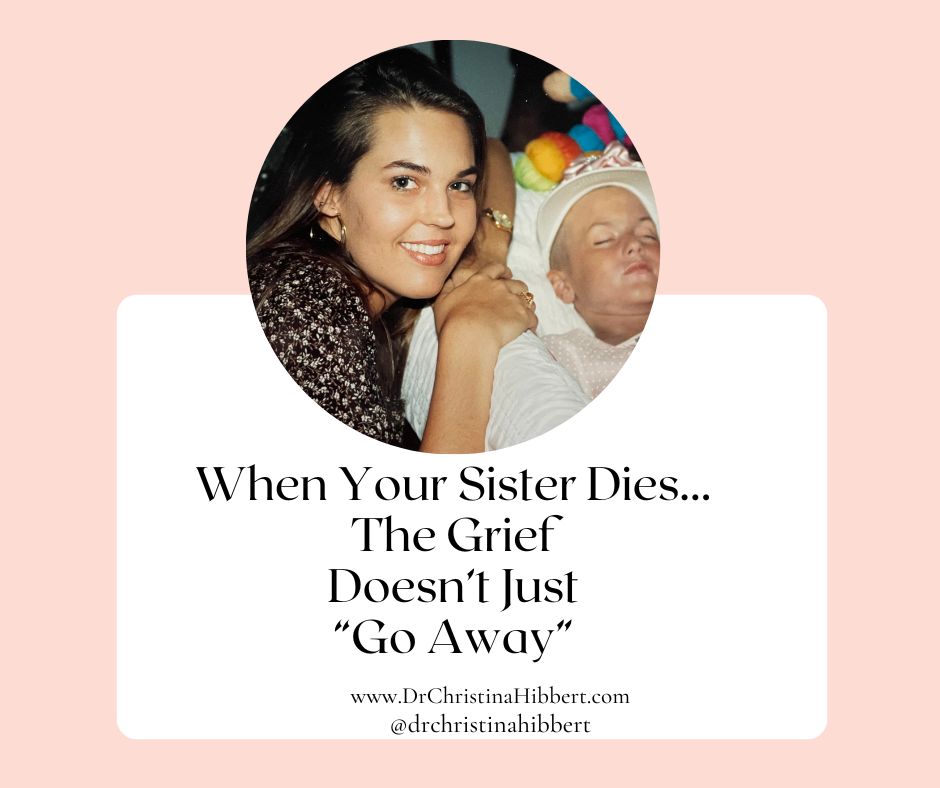
12 Sep When Your sister Dies, The Grief Doesn’t ‘Go Away’
Two of my sisters have died, and one thing I know for sure is this: The grief doesn’t “go away.”
One died of cancer, as a child. The other died of an overdose of alcohol and acetaminophen, later ruled a suicide, as a too-young adult.
Both losses were traumatic, though in different ways.
I’ve written a lot about my sister, Shannon’s, death, especially because it happened so shortly after her husband had died of melanoma, and because it changed my life so profoundly, as we inherited their two young sons just before I gave birth to what would have been our fourth child, going from three to six kids in just weeks.
That was the epitome of traumatic–for us all. I wrote an award-winning book about it, This is How We Grow.
But I haven’t shared as much about the death of my youngest sister, McLean, or “Miki,” as we called her.
“Why?” I wonder.
Because it was so long ago?
Because I’d already “dealt with” that loss?
Because I was so much younger and hadn’t had so many other life traumas?
Because the world teaches us that we must “heal,” “overcome,” “let go” and “move one” from the loss and grief? It tells us that the grief will somehow “go away,” and that this is what’s “normal”?
Probably all of these, and more.
18 year-old me with my 8 year-old sister Leighton & 7 year-old sister Miki.
What I do know for sure about the death of both my sisters is this:
1) The world is wrong. Most don’t know what to do with grief, and few understand the complexity and depth of losing a sibling.
2) The grief of losing a sibling never goes away.
3) There is no time limit on “healing” our grief.
4) While we can, and I believe should, engage in grief work, it doesn’t make us ever “forget” or “move on.”
5) We simply learn to live with the loss of the one we love so dearly, forevermore.
In fact, it’s been 31 years since Miki died as I write this, and…
I’ve been remembering and grieving her in new ways, more than I have in years.
You see, Miki had cancer, and now, so have I. I know now how profoundly our life experiences can not only bring losses to the surface in new ways; we begin to understand, relate to, and cope with these losses in new ways, too.
Miki was only 6 when she was diagnosed with a stage 4 “Wilm’s Tumor,” or cancer of the kidneys–a type of cancer found only in young children. I was 17.
With wild blond curls and a sometimes shy smile, Miki was smart and funny, sweet and honest, compassionate and empathetic, strong, and a fighter.
Right after her diagnosis, as she started chemo, having just cut her hair, Miki with her shy smile.
Miki was and still is my hero–strong, a fighter, a “warrior,” but not like you’d think.
Miki was a fighter just by being herself–a child going through the horrors of cancer, enduring 18 months through chemotherapy, life-threatening surgeries, countless hospitalizations, and constant sickness. She “fought” simply by doing what must be done.
She was a strong just by being wherever she was–letting herself smile or cry, laugh or scream. She exuded the yet-untested hope of a six year old, while emanating the wisdom of a spirit and soul who knew far more than her tender years.
She was a warrior through her simple faith, love, and light. Her first surgery was scary for our whole family. The doctors said she only had a 20% chance of survival.
There I was with her in the pre-surgery room, feeling her fear, yet in awe of her spirit, strong, knowing she would, as she said, “either wake up and be with Mom, or wake up and be with Jesus.”
Miki showed me how to live while facing death.
A month or so after surviving that first surgery, Miki had been in the hospital for weeks, recovering. Her room was decorated with pictures and drawings from her first grade class, friends and family. Stuffed animals, balloons, and flowers filled every space, giving an air of breath and life and love.
She’d lost all of her curly golden locks and was skinnier than ever–but her smile! Her attitude! Her child-filled wonder! I’d visit after high school most days. She inspired me then. She still does everyday.
Miki showed me how to authentically show up, feel, and be.
I recall one of those after school visits, showing up in the pediatric unit just as they were attempting to get an IV into her too-thin, weakened arms. They couldn’t get a vein and kept poking and poking her. My mother was in the hallway in tears as I arrived, being comforted by the nurses. A nurse pulled 17 year-old me into the corner and said,. “Your mom can’t handle this right now, You need to step in and be there for your sister.”
Miki was sobbing and in pain as I entered the room. Her voice still haunts me: “It hurts, it hurts. I want my mom,” she kept crying.
I sat by her side, holding back my own 17 year-old tears, being as “brave” as I could be, and simply said, “I’m here, Miki. Mom can’t be here right now, but I’m here. I love you.” They attempted again, and finally the IV was placed. It’s the most vivid memory I have of her illness, and now…
It’s even more powerful in my mind, as I, too, have chemotherapy-ruined veins.
Every time I get an IV or blood drawn, “It hurts, it hurts.” And “I want my mom,” too, but I’ve usually stayed silent, never let the pain or fear or exhaustion show, and been the “good patient,” even though it takes several attempts to finally get it done.
I admire Miki as a child, crying, saying “it hurts” and asking for that help and support of her “mom.”
Our 8th attempt to get a “good vein” for my final chemo infusion, Dec 2019.
I admire that child simply letting her feelings be real and be heard. She has taught me to do so more often, too.
I recall a year later, on a family vacation in San Diego, she became so ill (from chemo) that she had to spend a few nights in the children’s hospital. I volunteered to spend a night with her, to give my parents a break.
I also just wanted to be with her–to have that time. We played cards. We drew pictures. We both wrote a letter to my boyfriend (now my husband), who had just left to serve a 2-year mission for our church. She loved him like I did. We were just “us”–oldest and youngest sisters, together.
A favorite memory of mine to this day, she taught me that it’s also OK and even good to smile, laugh, and live, even if only in tiny moments, while trying to simply survive.
Miki always has been, and still is, my hero.
She became my hero when I was a teenager watching her make a video with her 7 year-old friends, putting on her bob-length blond wig and saying, “I’m a girl!” Then, taking it off to reveal her bald head, saying, “I’m a boy!” and laughing hysterically.
She was my hero as I watched her simply be herself, no matter what that meant–whether in pain, or sickness, or humor or strength. Yes, I already looked up to Miki as my example for how to live! And how to die….
My little sister, McLean (or Miki-7) and me (18) at Disneyworld for her “Make-a-Wish” vacation. Such a fun family trip, only months before she died of cancer.
But now that I, too, have faced my own mortality through breast cancer…
I understand her pain and sorrow so much better.
I feel her exhaustion and weakness.
I appreciate and try to emulate her resilience and her humor.
I have now had to endure so many of the same unspeakable experiences, and I too have that newfound depth of appreciation for every single day.
And I have done my best to show up, real and raw, authentic and unfiltered, to share my experiences in “Miki-like” ways here, in my life, and on social media (follow my journey on IG, Facebook, TikTok, YouTube)
Miki died shortly after her 8th birthday.
On September 8th, 1994, when I was 18 years old, I got a call from my Dad saying, “Miki’s dying.” My sister Shannon and I, both away at Brigham Young University in Utah, were to fly home to Phoenix first thing the next morning. It was the second day of my second year of college .
I woke to a too-early phone call from my sobbing father. “Miki died in the night,” he said. I mourned not seeing her one last time.
I remember walking the campus early that morning before our flight, telling my teachers I’d be gone for a while because “My sister died.” Wearing sunglasses, walking this gorgeous fall-colored mountain campus, I thought:
“Why hasn’t the world stopped? Why is everyone acting like everything is normal? My sister just died.”
This is a feeling now familiar to me through other deaths–expected deaths like grandparents, still too soon deaths of my father-in-law and aunt, and of course the far-too-young and tragic deaths of my sister Shannon, her husband Rob, of my dear friend Jody to suicide, and my beautiful friend Minae to pancreatic cancer.
I relate to the ghosts of my life, because I understand their stories, because they have become pieces of my own.
I look to their lessons of woe and examples of triumph as I continue facing my own cancer, trauma, PTSD, and chronic issues. All these things continue to leave me wondering:
[tcb-script async=”” src=”//www.instagram.com/embed.js”][/tcb-script]
“Why hasn’t the world stopped? Why is everyone acting like everything is normal?”
Today, as I remember “Miki Day,” as I call it, the day she died, now, 31 years later…
1) I’m more focused on Miki’s life and how she lived, how she fought and survived, on who she was. A chlld in years, a sage in experience.
2) I thought I’d “processed” her death–in therapy in college two months after her funeral; as a young mom struggling with postpartum depression (understanding now the love a mother has for her child and sobbing to my mom, “I finally get it–how you must have felt when Miki died. I’m so sorry, Mom.”); and on and off through the years as her birthdays, death anniversaries (like today), and “September 11th” (the day she was buried and my mother’s birthday, a day that would become a day of mourning for the world) has came around and around. I HAVE processed, and continue to do so as my lie unfolds.
3) I thought the grief was “healed,” “done,” had “gone away,” because I’d done the grief work.
I thought what was left was only LOVE.
Love IS left.
But now I know for sure that also:
The grief doesn’t just “go away.”
It’s not a problem to be solved, an amount of time to wait, or even a certain set of actions to take.
No.
Grief is something you learn to live with.
The loss of a sibling is something we grow up with.
The grief comes and goes. Ebbs and flows. Hurts, and brings joyful memories. It’s always there, though it doesn’t always scream or throb or ache.
Grief heals, yes, but for me, and for most, the “hole” remains.
You get back to a sense of feeling “Whole,” but you still have this HOLE–because that was your sister, the one who should have grown old by your side. The one who should have survived your parents and grandparents, but who DIDN’T.
It doesn’t make sense, losing a sibling. It’s insensible.
And yet here I sit, trying to make some sense, and trying to share some of it with you.
Mostly, I wanted you to learn about my sister, Miki, and take what will serve you from her life, and mine.
The grief doesn’t go away when you lose a sister. The love doesn’t either.
She is with me, has been with me, has supported me through cancer treatment, and she is here now, whispering: “Share my story, sweet sister. For it is in sharing our stories that we connect, grow, and heal.”
Coming soon: 7 Truths about grieving the loss of
a Brother or Sister
Subscribe below for post updates, exclusives, inspiration, and more.
[tcb-script src=”https://drchristi.mykajabi.com/forms/97851/embed.js”][/tcb-script][tcb-script src=”https://drchristi.mykajabi.com/forms/2147577813/embed.js”][/tcb-script]
Share your story, below. How have you grieved, healed from, or experienced the loss of your sibling? What do you do to help you honor them, remember, and remind yourself you’ll never “get over” losing them? We are not alone. We have each other.

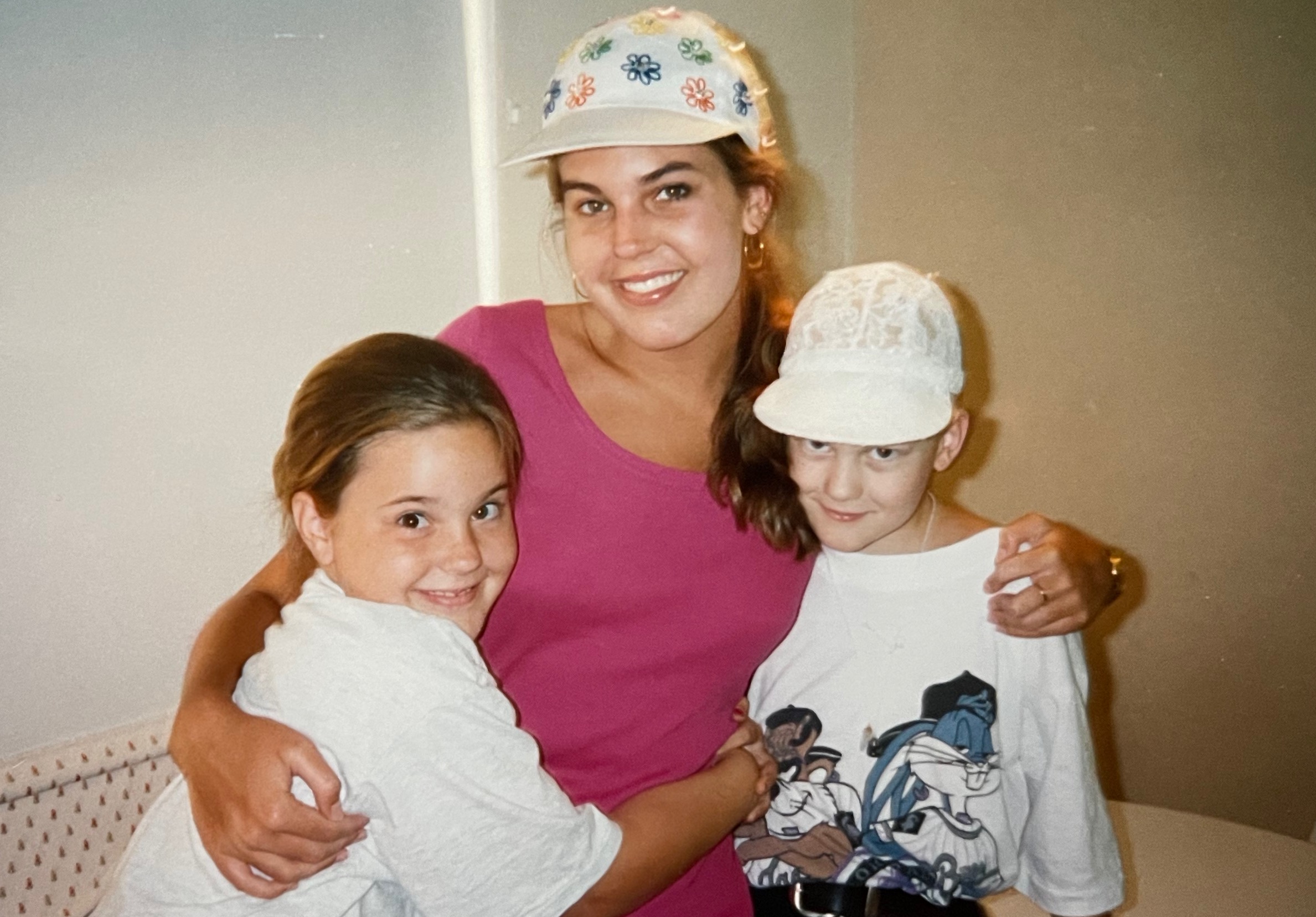
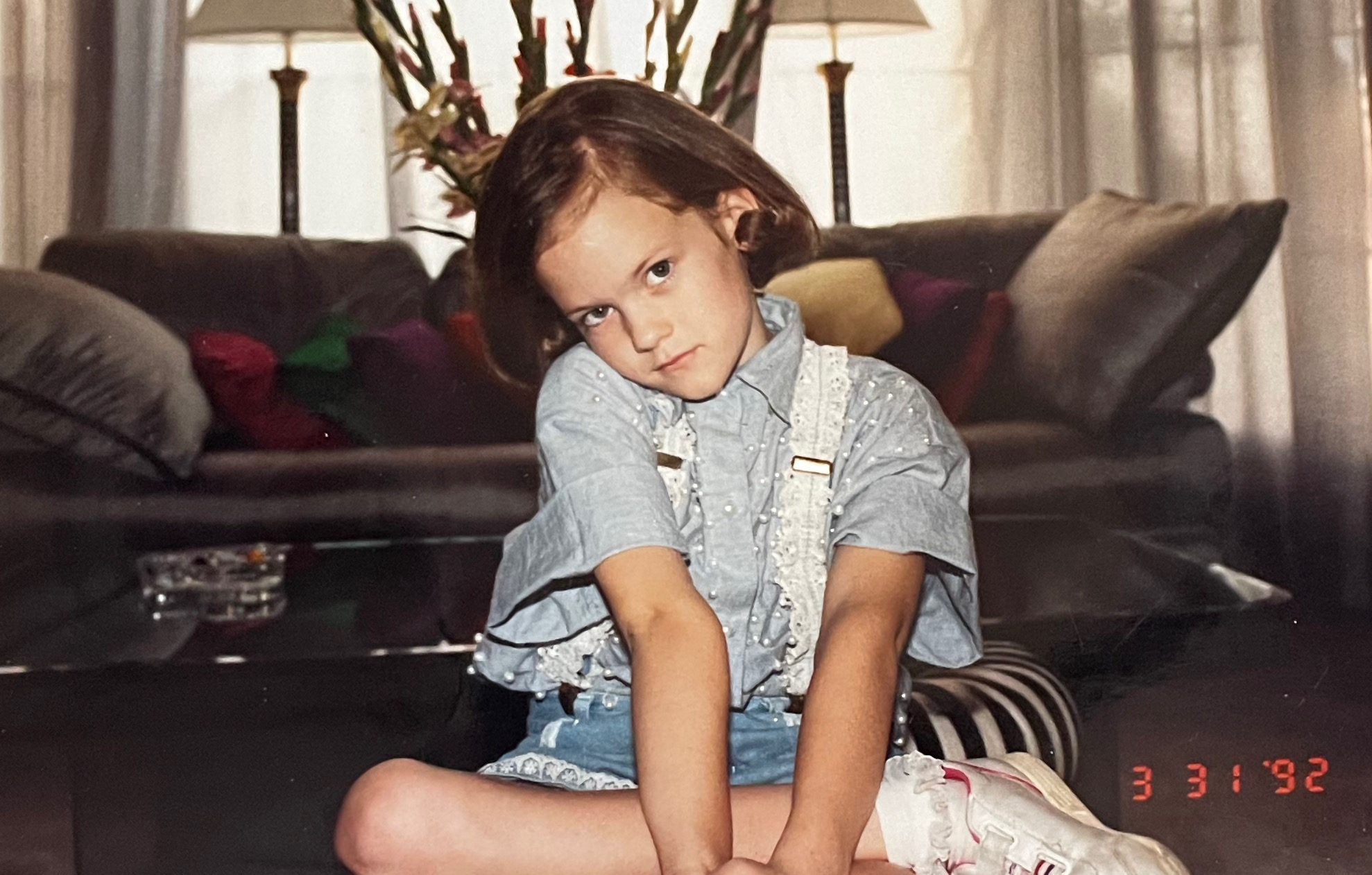
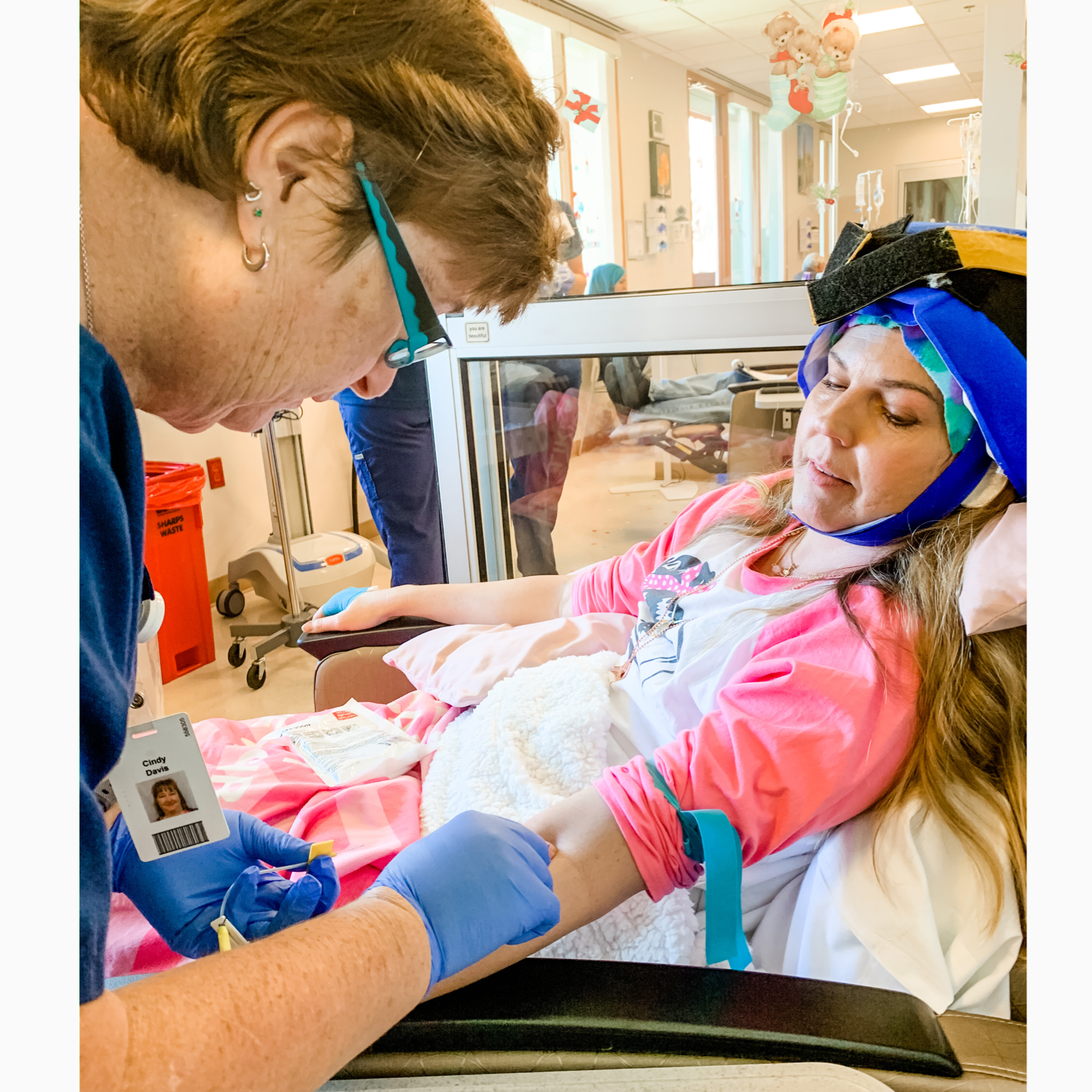
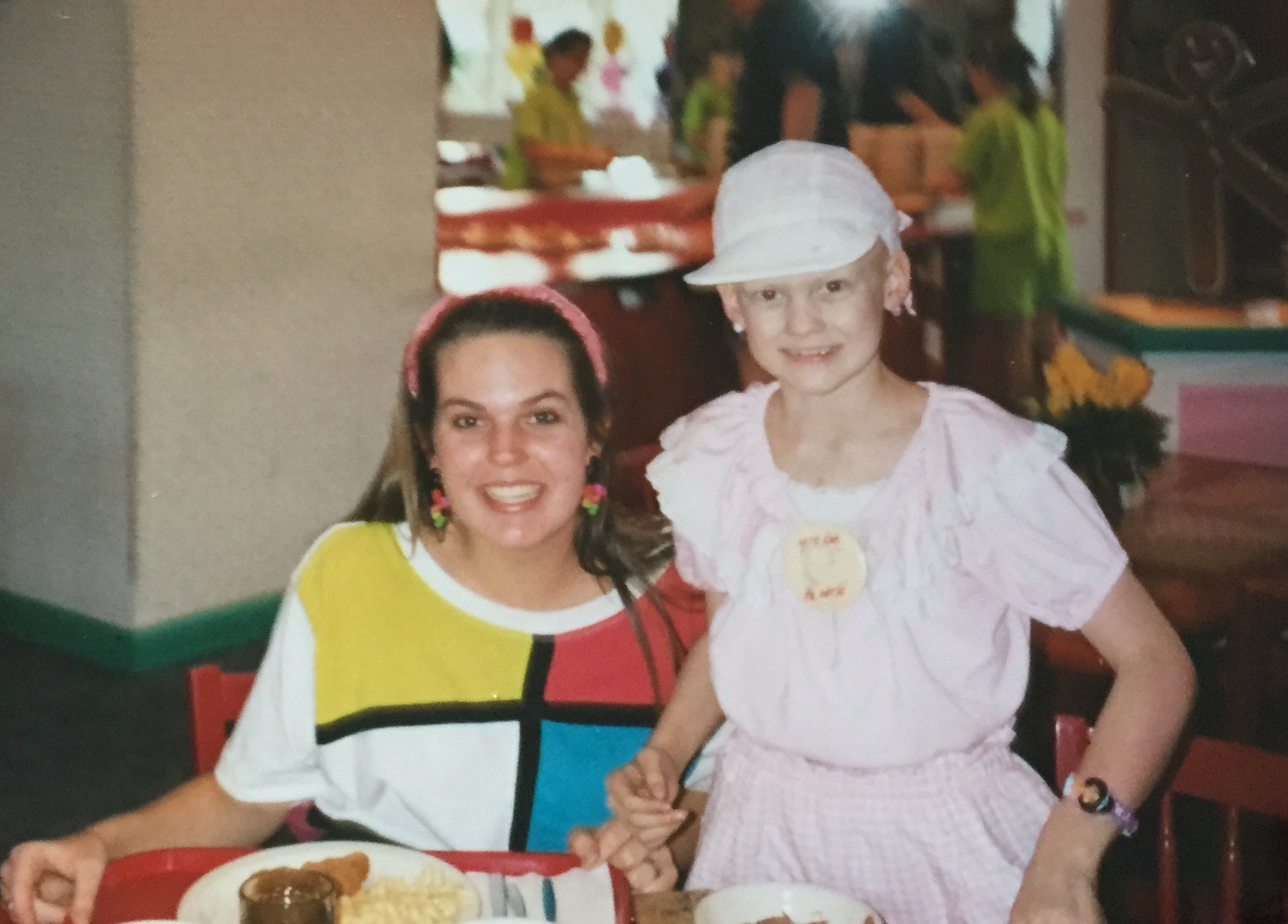
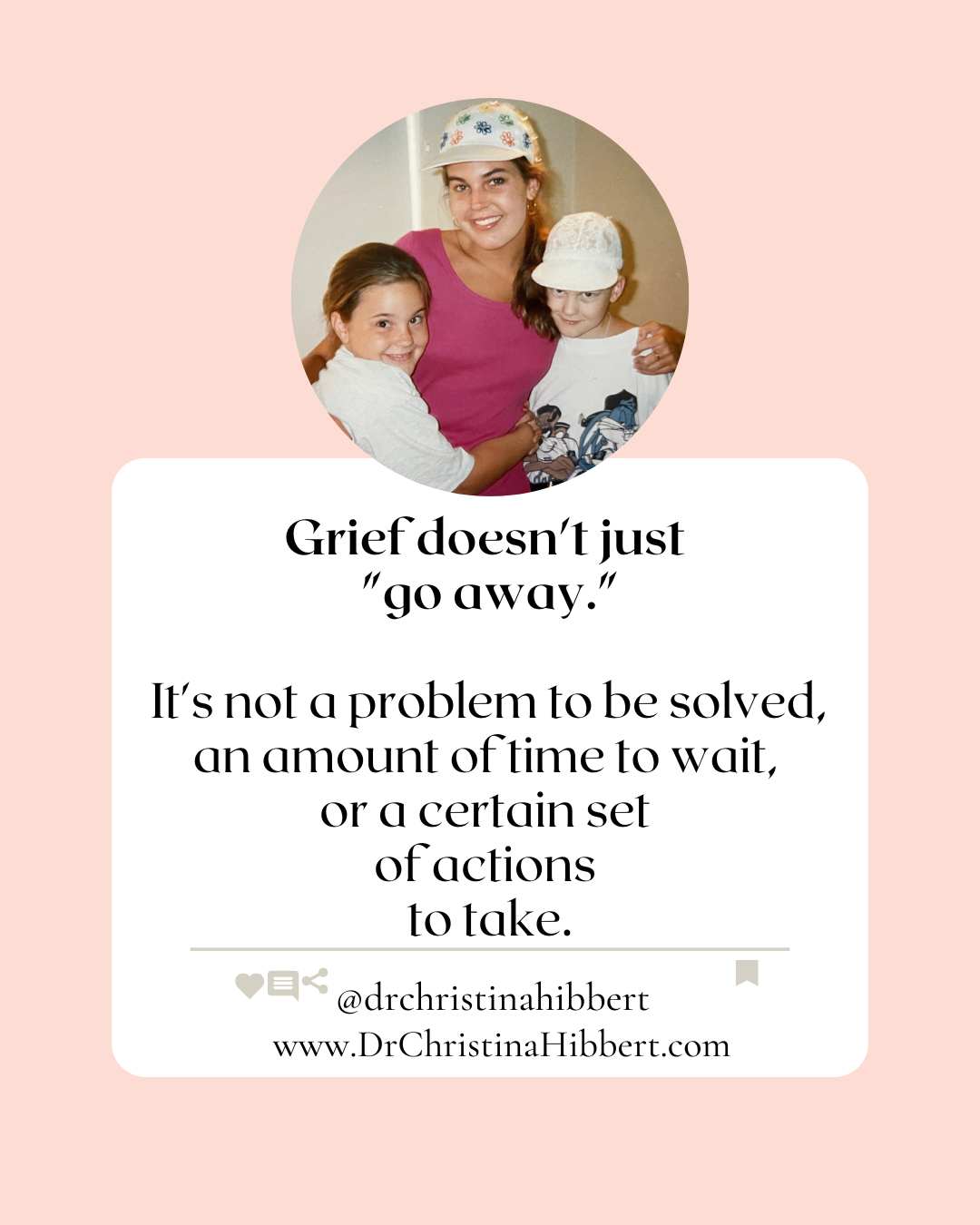
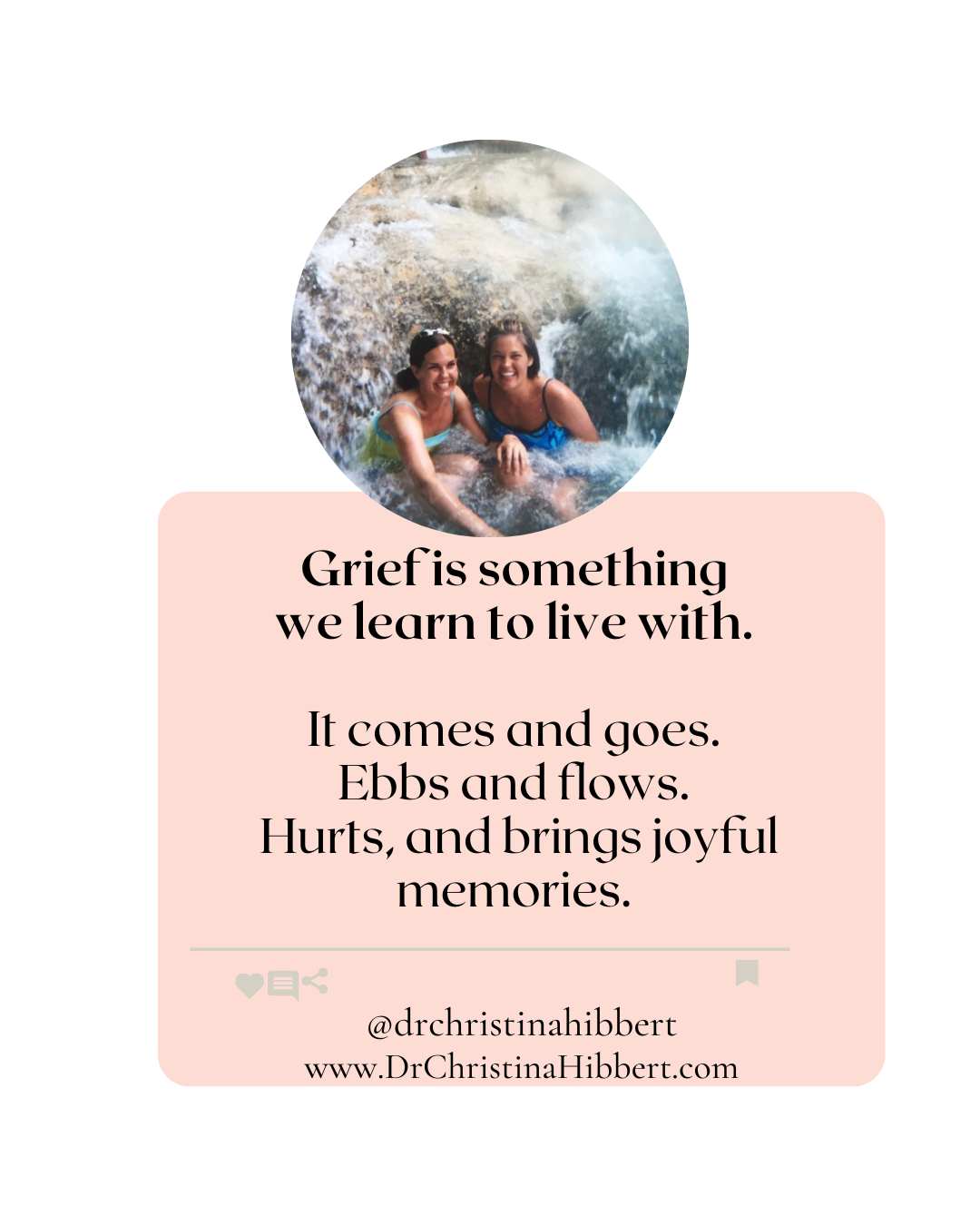

WOW Dear Christi,
You are a powerful woman with a powerful life story, and I know first hand of your kindness and passion for helping others. thank you for sharing your life to help others,
Karen
Thank you my friend. I am grateful!
Thank you for sharing such a personal story. The loss of a sister, and in your case, 2 sisters, is a uniquely painful one. It is so true that, although grief comes in ebbs & flows, love never fades.
Thank you Nora.
While I have not dealt with losing a sibling I did lose my mother unexpectedly two years ago. She had a heart attack and within two days was gone. I held her hand and stroked it as she took her last breath. I remember it vividly. Watching the line on the machine go to a straight line. It’s two years later and it’s still very painful. I can look back on some memories and smile. I will say something and think boy do I sound like her. She never got the chance to meet her youngest great granddaughter (my granddaughter and name sake) born a year ago. I totally get the feeling of how can life go on but yet it has. Please know that your story of your sister hit home. Thank you for sharing her with us. May God continue to bless you. What you do matters!!!!
Thank you for sharing about your dear mother. I had hoped in writing this it would touch those who’ve lost parents or children, spouses or dear friends. The grief is similar. And sudden and traumatic loss, like yours, I’ve found, complicates the grief all the more. I wish you the best in your lifelong grief journey.
Dear Dr Christina,
I am an only child, but my mother miscarried when I was 9. All of the happy anticipation just went to dust. I did not know what to do to help my mother. It so happened that my best friend since age 3, also an only child, told me that her mother had recently miscarried too. We shared our grief even though we were not of an age to totally understand the grief our parents must have felt. I have had a miscarriage also. People say the rudest things, like “it wasn’t a real baby yet”. Ignorant. My heart goes out to you and to all who have lost loved ones. September is a hard month for me too. My father died on 09/18/09, just hours before the Jewish New Year started. In Judaism, the number 18 stands for life, but my dad did not get inscribed into the book of life for the year that started that sunset. I agree, we never get “over” the grief of loss. I lost precious pets in Septembers, as well as some pets of friends and family members, dogs that had comforted me when I needed a big furry hug. We can all mourn our losses together, as people who actually understand the feeling of grief that never goes away. In the bereavement support group that I attend when I can, we say “You never get OVER the loss, all you can do is get “THROUGH” it. And we have to get through it over and over. It never goes away. Please know that your grief is honored by those of us who care about you.
With love and hugs,
Shirley
I was thinking of my sister when I looked for something online to explain the hole that I have 51 years after losing her. I wish I could tell her story, but she died when I was 2 months shy of 2 years old and she was just under 3. Because I was so young, I don’t have memories of her. However, the life I shared with her and then losing her has haunted me throughout my life. My mother says that we were inseparable and she was always being a second mother to me even at her age. After she passed, I went to live with my grandparents and my father. I grew up a very lonely child always feeling unimportant as well as feeling like my mothers absence was my fault. I cry as I write this. I continue to love my sister, and still have a hole where she should be. Thank you for having the courage to write this and having a space for me to share my story.
I am so terribly sorry for the loss of your beautiful sister. I understand why you would feel the loss your whole life long. And it sounds like so much changed for you when she died that there were multiple simultaneous losses. I’m so glad you can continue to remember and grieve your sister. You are not alone. <3